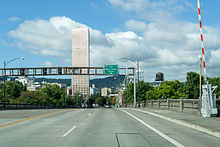Burnside Street

Facing west on the Burnside Bridge
|
|
| Former name(s) |
|
|---|---|
| Owner | Portland Bureau of Transportation |
| Length | 17.6 mi (28.3 km) |
| Location | Portland and Gresham, Oregon, U.S. |
| From | Mount Hood Highway |
| To | SW Barnes Road |
| Construction | |
| Completion | 1892 |
Burnside Street is a major thoroughfare of Portland, in the U.S. state of Oregon, and one of a few east–west streets that runs uninterrupted on both sides of the Willamette River. It serves as the dividing line between North Portland and South Portland. Its namesake bridge, Burnside Bridge, is one of the most heavily traversed in Portland.
What is now Burnside Street was originally named B Street east of Southwest 16th Avenue and Washington Street west of S.W. 16th (as a continuation of Washington Street from downtown). In 1891, B Street was renamed for Portland merchant David Burnside, and in 1933 Washington Street west of SW 16th was renamed Burnside Street. Burnside became Portland's principal east–west axis following the 1912 Bennett Plan, soon becoming one of the widest streets in the city. The street runs from SW Barnes Road in Sylvan-Highlands to the Mount Hood Highway in Gresham, a distance of over 17 miles (27 km). It crosses the Willamette River via the Burnside Bridge, where the White Stag sign is visible.
For a number of years, the portion of Burnside between NW 19th Avenue and NE Sandy Boulevard was designated U.S. Route 30. It is served by TriMet bus line 20 between Barnes Road and NE/SE 102nd Avenue, and several MAX Blue Line light-rail stations are located along its route in East Portland between 102nd Avenue and Ruby Junction.
...
Wikipedia
